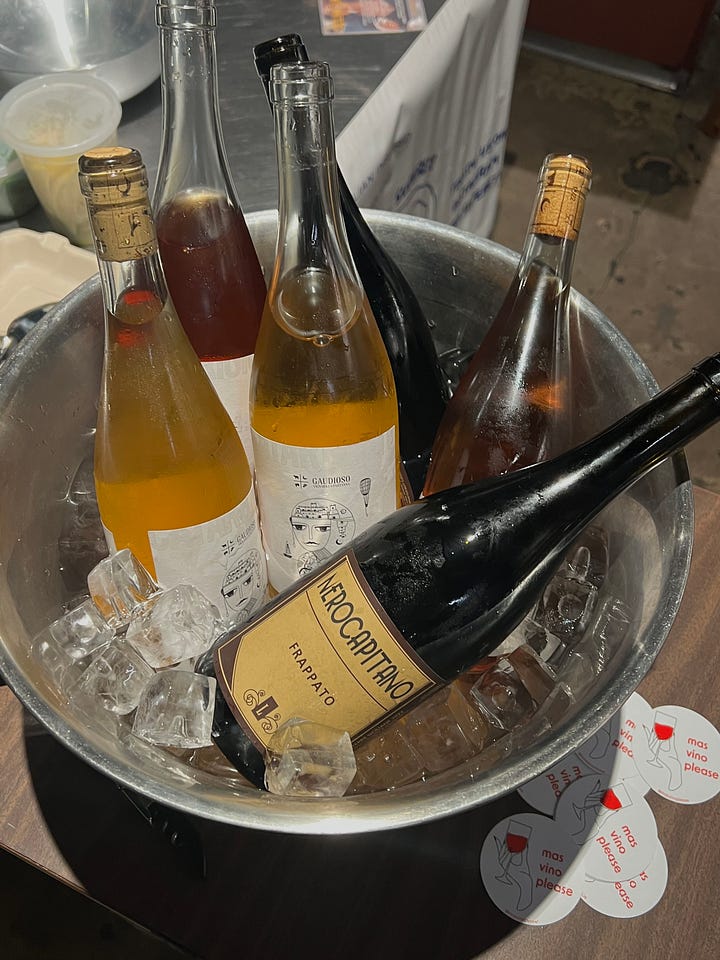Searching for My Sicilian Heritage Through Wine
A little history about the nectar of my people.
Last week, I curated wine for an event I co-hosted called, Sicilian Summer. I wanted a chance to highlight Sicilian wines for a variety of reasons. One being that it's a lesser known region among Italian wines, despite the fact that some of the most iconic natural wine producers are coming out of Sicily (like Frank Cornelissan and Arianna Occhipinti and Gabrio Bini). But also because of my own personal heritage and ties to the island.
My great grandfather emigrated to the US through Ellis Island, (twice, actually) from Sicily. He came from a teeny tiny town called Tripi in Messina, not to far from the coast but high up in the hills. I google mapped the town once and it's literally a tiny commune built into the hill with a train that passes through it, an archeology site and not much else.
My Italian heritage has been a bit of lore for me ever since I was a kid. There's been a big question mark inside me about where my family comes from. My grandma was always vague about her youth and my mom has her own missing pieces on her father's side. I overcompensated for all those blank spaces by leaning deeply into my Colombian dad's side of the family.
I used to beg my grandma for tidbits of our Sicilian past. Begging her for recipes or memories she kept stored away in her heart. She rarely shared anything except the usual Sunday Sauce story or how her father owned a bodega on 4th and Gless in Boyle Heights -- not because she didn't want to, but I think she just can't remember anymore. That's the problem with being American. A lot of people are forced to assimilate: deny their culture, their language and their history. I suppose some people stay loud and proud, but my great-grandfather died in the 50s and a lot of that cultural connection went with him. My mom has kept it alive as best she could -- sharing recipes with me, perfecting her own Sunday sauce and reminding my grandma of things when her memory gets fuzzy. As my grandma gets older though, memories have started to pour out of her. Sometimes they're on a loop, but other times she'll share moments of her childhood -- it wasn't until 5 years ago that I learned that she spoke Italian. How did I go nearly 30 years not knowing my grandmother grew up speaking Italian??
Nowadays, I try to teach myself as much as I can about my heritage: through movies, eating my friend’s Sicilian food, poking around the Italian market, through wine and winemakers stories. It’s kind of like walking uphill in mud, but it works for me.

I was really proud of the line up I curated last Thursday. Nerocapitano (Frappato) by Lamoresca and Catarratta and a Pinot Grigio by Gaudioso. 3 wines that I felt really showcased the wine of this region.
So what's Terre Siciliane all about? Well, for one, it's extremely terroir driven. Meaning, the wine not only expresses the grape but also the type of soil, how sunny it gets and the way the salty sea breeze affects the vineyard, and all the other elements that contribute to a grapes growth. The island is prime for wine making due to its hot sunny climate and fertile soils— which is why Sicilians have been making wine for thousands of years via the Greeks. It’s actually thought that the word for “wine” was used by Sicilians wayyyyy before the Latin word for wine was derived.
Present day Sicily has influencers and foodies posting their Italian summer content all year long—but lemme tell ya, Sicily has alwayssss been that girl! In ancient times, the Greeks loved Sicily because of all the delicious food it had: olive oil, fish, and wine (Greeks were the OG tinned fish girlies, apparently) and Romans and other invaders felt the same.
Because of the terroir, like many vineyards proximity to Mt Etna, volcanic soils, hilly landscapes, maritime breeze and Mediterranean coast the wines can range from smokey to salty, and earthy to refreshing. While the region may not be huge, the variation of microclimates creates a variety of wine.
Sicily produces mostly dry wines, but they also produce substantial sweet wines in Marsala (yes, like chicken marsala) and Pantelleria. In the 1700s, there was a boom in Marsala due to the British’s love for fortified wines, which helped put Marsala on the map internationally. Wines in the region are made mostly from native grapes: Catarratto, grillo, zibibbo, inzolia (white grapes) and frappato, nero d'avola, & nerello mascalese (red). Occasitionally you might find Pinot Grigio or other more international grapes, but not often. And it's for the best (in my opinion). Native varietals are always the most interesting to me. This was the land they were created for. To me, the best expression of any terroir is through a native grape .


I poured a frappato from near-ish Mt Etna (an active volcano). It was a light, chillable red, that was layered with fruit and pepper and smoke, while the white wines (catarratto and pinot grigio), I poured from the southern part of Sicily were fresh, salty and refreshing from the maritime influence of the Mediterranean.
The wines of Sicily are elegant and powerful, yet most remain pretty affordable. A couple things in history happened here to make this happen: one being mass immigration to the US and LATAM and the other being the US Prohibition of the early 20th century. Much of the market and labor force was cut off from Italy and the quality of wine diminished greatly between 1920-1960. Most vineyards were selling grapes in bulk to larger co-ops, which focused on quantity over quality, and thus low prices.
Finally, in the 80s a few Sicilian winemakers begun to champion smaller batch, higher quality wines. Finally, after a couple decades of rebuilding their winemaking reputation, Sicilian winemakers started to put their focus back on reviving indigenous grapes like nerrello mascalese and other Etna wines.
Today, Sicilian wine production focuses on high quality, small production wines while emphaszing sustainability (1/3 of the islands vineyards are certified organic!) and indigenous grapes. They’re also brilliantly food friendly, especially paired with breezy seaside fare like shellfish and fresh tomato sauces or any selection of charcuterie.
Last week was really about giving myself a chance to taste and savor my heritage a little and figure out what it means to me. Wine has the ability to capture a time and place into a bottle so that the bottle is filled with memories of the wine's homeland. I wanted to know what that was like, and I started to find it inside these wines. Maybe it was just my soul doing a bit of searching, but a few of those sips, I swore I could see my ancestors, in their quaint little town, enjoying a glass or two of frappato.




fellow wine lover here! (parents are Ecuadorian & Sicilian-American, so a few parallels). Would love to see a trip to Sicily & favorite wines/vinotecas there!
nero d'avola had no idea this was scilian wine. one of my go to wines. enjoyed the article.